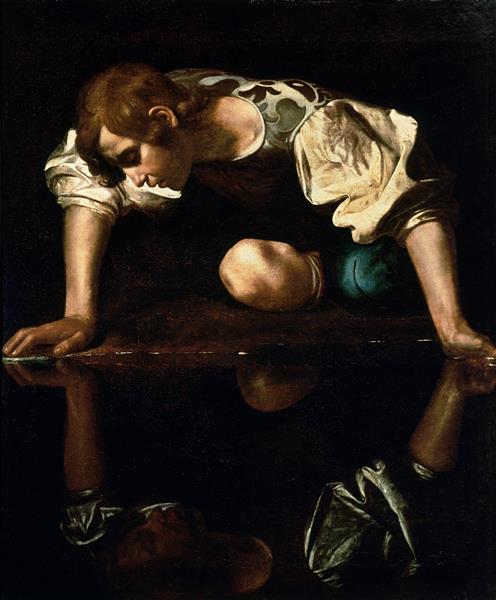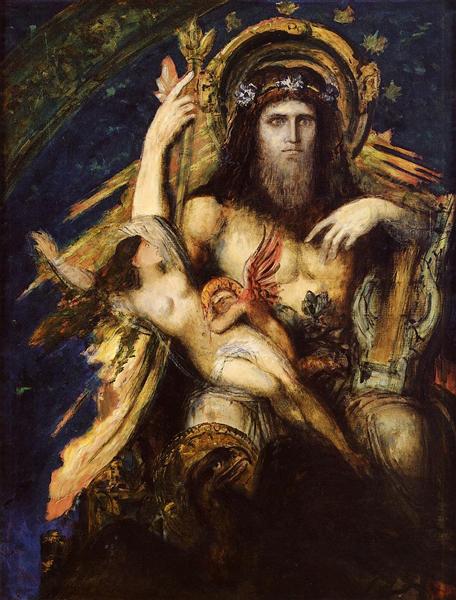“The Story of Narcissus” – Ovid

“Narcissus” (c.1599)
Caravaggio
______
Thus did the nymphs in vain caress the boy,
the boy, Narcissus
in vain , Narcissus‘ pride, you’ll remember,
was such that love-sick maid[s] uselessly
[their] flame confess’d, Narcissus was
oblivious to their advances
He still was lovely, but he still was coy;
When one fair virgin of the slighted train
slighted train, row of followers, love-sick
maid[s] who’d been spurned by Narcissus
Thus pray’d the Gods, provok’d by his disdain,
provok’d by his disdain, angered by his
rejection
“Oh may he love like me, and love like me in vain!”
beseeches the one fair virgin
Rhamnusia pity’d the neglected fair,
Rhamnusia, goddess of Retribution,
also known as Nemesis
And with just vengeance answer’d to her pray’r.
just vengeance, justified retribution
There stands a fountain in a darksom wood,
Nor stain’d with falling leaves nor rising mud;
Untroubled by the breath of winds it rests,
Unsully’d by the touch of men or beasts;
High bow’rs of shady trees above it grow,
And rising grass and chearful greens below.
bow’rs, enclosures among trees
greens, lawns, grasslands
Pleas’d with the form and coolness of the place,
And over-heated by the morning chace,
Narcissus on the grassie verdure lyes:
verdure, greenness
But whilst within the chrystal fount he tries
To quench his heat, he feels new heats arise.
chrystal fount, glistening fountain,
or spring
For as his own bright image he survey’d,
He fell in love with the fantastick shade;
shade, apparition, illusion
And o’er the fair resemblance hung unmov’d,
see above
Nor knew, fond youth! it was himself he lov’d.
The well-turn’d neck and shoulders he descries,
descries, espies, catches sight of
The spacious forehead, and the sparkling eyes;
The hands that Bacchus might not scorn to show,
Bacchus, god of Wine and Revelry, also
known as Dionysus
And hair that round Apollo’s head might flow;
Apollo, god of the Sun
With all the purple youthfulness of face,
That gently blushes in the wat’ry glass.
wat’ry glass, the chrystal fount
By his own flames consum’d the lover lyes,
And gives himself the wound by which he dies.
the wound, the sight of himself
dies, succumbs, is undone
To the cold water oft he joins his lips,
Oft catching at the beauteous shade he dips
His arms,
shade, see above
as often from himself he slips.
slips, becomes abstracted, bewildered
Nor knows he who it is his arms pursue
With eager clasps, but loves he knows not who.
he cannot give substance to this illusion
What could, fond youth, this helpless passion move?
What kindled in thee this unpity’d love?








